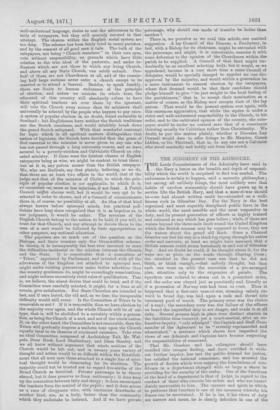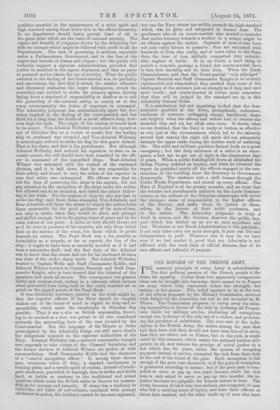THE JUDGMENT ON THE AGINCOURT.
THE Lords Commissioners of the Admiralty have read to the Navy a lesson on the breadth and depth of responsi- bility which the world is surprised to find was needed. The unforeseen is certain to happen, said a sarcastic philosopher ; but among all unlikely things, the most unlikely were that habits of careless seamanship should have grown up in a service like the British Navy, and that a man-of-war should be—we had almost written could be—stranded on a well- known rock in Gibraltar Bay. For the Navy is the best organized and most superbly disciplined public force in the whole world, the most sensible and the most responsive to duty, and its present generation of officers as highly trained and cultured as any which has gone before ; while, if there are waters beyond the three-mile limit round the United Kingdoms which the British seaman may be supposed to know, they are the waters about the grand old Rock. Since a Channel Islander can feel his way in a thick fog zigzag through his native rocks and currents, at least we might have assumed that a British seaman could steam harmlessly in and out of Gibraltar Bay. And no doubt he could, if he thought about it, for the ways are as plain as the roads through Charing Cross ; the mischief in the present case was that he did not think, or think enough,—that nobody thought, but that each one went on with the execution of a pro-arranged plan, attentive only to the exigencies of parade. The squadron was ordered to steam out in a prescribed order, and the order was obeyed just as punctually and literally as if a procession of Norway rats had been en route. Thus it happened that a first-rate man-of-war, steaming calmly on- ward in broad day, was laid upon a rock and thrust into imminent peril of wreck. The primary error was the choice of a road ; the secondary error was the failure of the officers on board the imperilled ship to see danger, and evade it at all risks. Several persons high in place were distinct sharers in the liabilities thus incurred, yet a court-martial, after an ex- haustive inquiry, "only adjudged" the Captain and Staff Coin- mender of the Agincourt to be "severely reprimanded and admonished," a sentence which shows how imperfect the views of our Admirals and Captains have become respecting the responsibilities of command.
That Mr. Goschen and his colleagues should have rectified this meagre finding, and have rectified it with- out further inquiry, has met the public demand for justice, has satisfied the national conscience, and has arrested the growth of doubts which were sapping the foundations of con- fidence in a department charged with so large a share in providing for the security of the realm. One of the functions of the head of a department is that of judge, in regard to the conduct of those who execute his orders and who are imme- diately answerable to him. The manner and spirit in which he performs that function is one of the measures whereby his fitness can be ascertained. If lie is lax, if his views of duty are narrow and mean, he is clearly defective in one of the qualities essential to the maintenance of a strict spirit and high standard among those below him in the official hierarchy.
In no department should laxity prevail, least of all in the great arms which are the bases of national security. The vigour and breadth of judgment shown by the Admiralty fur- nish an example which might be followed with profit in all the Departments. The task of governing is arduous, especially under a Parliamentary Government, and in the face of the angers and hatreds of classes and cliques ; but the public will certainly support a rigorous administration, provided that justice be manifest in the rigour displayed, and that no party or personal motive taints the act of severity. What the public resented in the finding of the Court-martial was its partiality and narrowness, the fact that it struck the smaller offenders and dismissed scatheless the larger delinquents, struck the secondary and omitted to strike the primary agents, thereby laying down a standard of responsibility so shallow as to risk the grounding of the national safety, so scanty as to fine away unwarrantably the duties of superiors in command. The Admiralty judgment has authoritatively upset the doc- trines implied in the finding of the court-martial, and has fixed for a long time the limits of a naval officer's duty, how- ever high his rank. The origin of the mishap is traced back to its source. Vice-Admiral Wellesley conducted his squadron out of Gibraltar Bay on a course so unsafe that the leading ship to starboard was stranded, and Vice-Admiral Wellesley is accordingly ordered to strike his flag for this grave default. That is his share, and that is his punishment. But although Admiral Wellesley had ordered his squadron to steer on an unsafe course, the evil should have been remedied by the offi- cer in command of the imperilled ships. Rear-Admiral Wilmot was entrusted with the control of the starboard division, and it is laid down that he was responsible for their safety, and bound to vary the orders of his superior in case that safety was endangered. His offence was that he left the duty of preserving the ships to his captain, did not pay attention to the navigation of the ships under his orders, but allowed one to be stranded, and risked the others follow- ing in her wake. For his neglect of duty he also has had to strike his flag ; and from these examples Vice-Admirals and Rear-Admirals will learn the extent to which the nation holds them answerable for the good guidance of its men-of-war, not only in battle, when they would be alert, and prompt, and skilful enough, but in the piping times of peace and in the calm waters of our ports. A sailor on duty should always act as if he were in presence of his enemies, not only those which float on the surface of the ocean, but those which lie perdu beneath its waters. The Pearl Rock was a foe possibly as formidable as a torpedo, so far as regards the loss of the ship ; it ought to have been as carefully avoided as if it had been a submarine shell; and the first duty of the Admiral was to know that the course laid out for his starboard division was clear of the rock's sharp teeth. But Admiral Wellesley trusted to Captain Wells and Staff Commander Kiddie, and Admiral Wilmot trusted to Captain Beamish and Staff Com- mander Knight, who in turn trusted that the Admiral of the squadron had made all secure. The consequence was general laxity and routine-work, ending in a calamity which fortune alone prevented from being fatal to the costly ironclad set to grind on the jagged points of the Pearl Rock.
It was absolutely necessary, painful as the work might be, that the superior officers of the Navy should be roughly shaken out of the frame of mind in regard to duty and re- sponsibility which made the catastrophe in Gibraltar Bay possible. That it was a slur on British seamanship, deserv- ing to be marked as a slur, was patent to all who considered seriously the astounding facts of the case revealed by the Court-martial. But the language of the Minute or Order promulgated by the Admiralty brings out still more clearly the obligations imposed on the supreme authorities of the Navy. Admiral Wellesley was a selected commander brought over expressly to take charge of the Channel Squadron, and the former services of Admiral Wilmot are spoken of with commendation. Staff Commander Kiddie had the character of a "careful navigating officer." If, among these chosen men, erroneous views of duty, a marked carelessness in framing plans, and a servile spirit of routine, instead of intelli- gent obedience, prevailed, it was high time to strike, and strike hard, at habits so contrary to the traditional and actual qualities which made the British sailor as famous for seaman- ship as for courage and tenacity: If steam has a tendency to injure the old habit of self-reliance, combined with prompt obedience to orders, the tendency cannot be too soon repressed,
nor can the Navy return too swiftly towards the high standard which was its glory and safeguard in former days. The gentlemen who sit on courts-martial also needed a reminder that undue leniency towards a brother in a scrape might be an offence against the nation. Captains of men-of-war have not only costly fabrics to preserve ; they are entrusted with hundreds of lives, also costly, and of more value to the State than the tons of iron skilfully compacted into redoubt-
able engines of battle. It is, no doubt, a baud thing to punish a comrade, perhaps a friend, but courts-martial have to face that hardship and do their duty. When the Lords Commissioners said that the Court-martial "only adjudged" Captain Beamish and Staff Commander Knight to be severely reprimanded and admonished, they marked their sense of the inadequacy of the sentence just as strongly as if they had used more words; and courts-martial in future must remember that they will be judged by the standard set up in this Admiralty General Order.
It is satisfactory, but not surprising, to find that the char- acteristic qualities of the Navy, promptitude, endurance, readiness of resource, unflagging energy, hardihood, shone out brightly when the officers and sailors had to recover the stranded ship and set her afloat once more. It shows, what no one doubted, that the Navy is really at bottom as effective as ever, just as the circumstances which led to the calamity proved that exactly the right old spirit did not adequately animate the upper ranks during the routine work of seafaring life. The solid and brilliant qualities flashed forth on a great emergency ; but the daily existence of a sailor is an emer- gency, a fact apt to get out of sight in the slumberous days of peace. When a public building fell down at Allahabad the Indian Viceroy ordered an inquiry, and when he obtained the report he punished nearly all the officers engaged in the con- struction of the building, from the Secretary to Government downwards. The sentence sent a chill tremor through the Public Works Department, and stirred up every official. The Navy of England is of far greater moment, and we trust that the rebukes and punishments inflicted by the Lords Commis- sioners on the authors of the Gibraltar catastrophe will revive the dormant sense of responsibility in the higher officers of the Service, and make them do justice to them- selves, to the honour of their noble profession, and to the nation. The Admiralty judgment is truly a word in season, and Mr. Goschen deserves the public sup- port which has backed up an act at once expedient and just. Weakness in our Naval Administration is like paralysis ; it not only takes away our main strength, it puts our life and independence in peril. Whatever else it may be, we have now, if we had needed. it, proof that our Admiralty is not afflicted with the most fatal of official diseases, fear of its own officers and infirmity of purpose.































 Previous page
Previous page